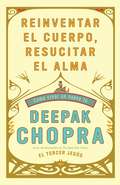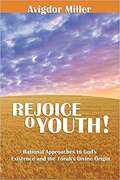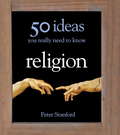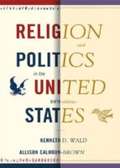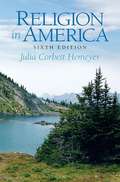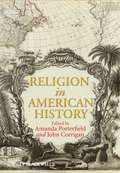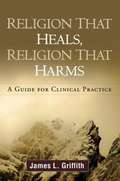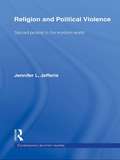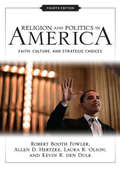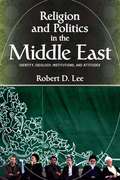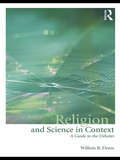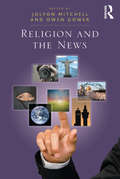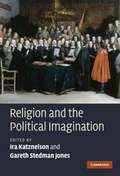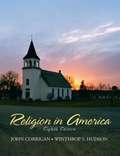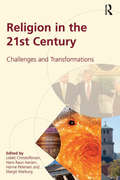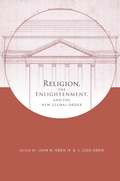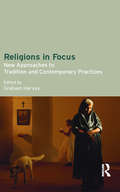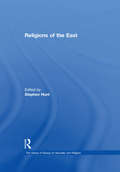- Table View
- List View
Reinventar el cuerpo, resucitar el alma: Como Crear Un Nuevo Tu (Vintage Espanol Ser.)
by Deepak ChopraTRASCIENDE LOS OBSTÁCULOS QUE AFECTAN A TU CUERPO Y A TU ESPÍRITU 15 años después de su gran clásico Cuerpos sin edad, mentes sin tiempo, Deepak Chopra revisa el milagro olvidadola capacidad infinita de renovación y cambio del ser humano. Tu cuerpo físico es una ficción nos dice Chopra. Cada célula está compuesta de dos elementos básicos: conciencia y energía. Aquí aprenderás a aprovechar esos elementos para cambiar los patrones de energía distorsionados que son la causa de las enfermedades y el envejecimiento. Pero la transformación no trata solo del cuerpo; debe incorporar también el alma. El alma aparentemente invisible, distante, y apartada del mundo material en realidad crea al cuerpo. Y solo al llegar a ella alcanzarás tu máximo potencial, y conseguirás mayor percepción, inteligencia y creatividad en todos los aspectos de tu vida. Reinventar el cuerpo, resucitar el alma ofrece 10 pasos cinco para el cuerpo y cinco para el alma que nos llevarána la auto transformación. Con su estilo claro y accesible, Chopra nos invita a vivir con él los milagros que suceden cuando conectamos el cuerpo directamente a los maravillosos misterios que dan sentido y significado a la vida directamente al alma.
Rejoice O Youth: Rational Approaches to God's Existence and the Torah's Divine Origin
by Avigdor MillerThe venerable Rabbi Avigdor Miller, reaches out to the heart of every Jew. In this three part Jewish Ideology Series he covers the integral tenets of Emunah and Bitachon (faith) that each and every one of us are to aspire to. His unique style brings the Father-to-son relationship between us and G-d, right to our fingertips.
Religion - 50 Ideas You Really Need to Know
by Peter StanfordThe need to understand religion and the role it plays in our world has never been more pressing. The beliefs and actions of the planet's 2 billion Christians, 1.2 billion Muslims, 800 million Hindus and 700 million followers of other religions has an impact on every aspect of war and peace, ethics, politics, reproduction, family and social structure across every civilization and continent. 50 Religion Ideas You Really Need to Know aims to lift the clouds of confusion surrounding religion and to address its key issues. What is the 'Golden Rule' and how does it unite religious people? How did the divisions arise between Catholics and Protestants and what do they mean for us today? What are the differences between Anglicanism, Methodism, Baptism and Presbyterianism? What separates Sunni Muslims from Shi'a Muslims? What does it mean to be Jewish? Award-winning writer Peter Stanford answers these and a myriad other questions in 50 Religion Ideas You Really Need to Know. Both readable and informative, it will appeal to anyone who wants to understand one of the most powerful and enduring forces shaping our world.
Religion - 50 Ideas You Really Need to Know (50 Ideas You Really Need to Know series)
by Peter StanfordThe need to understand religion and the role it plays in our world has never been more pressing. The beliefs and actions of the planet's 2 billion Christians, 1.2 billion Muslims, 800 million Hindus and 700 million followers of other religions has an impact on every aspect of war and peace, ethics, politics, reproduction, family and social structure across every civilization and continent. 50 Religion Ideas You Really Need to Know aims to lift the clouds of confusion surrounding religion and to address its key issues. What is the 'Golden Rule' and how does it unite religious people? How did the divisions arise between Catholics and Protestants and what do they mean for us today? What are the differences between Anglicanism, Methodism, Baptism and Presbyterianism? What separates Sunni Muslims from Shi'a Muslims? What does it mean to be Jewish? Award-winning writer Peter Stanford answers these and a myriad other questions in 50 Religion Ideas You Really Need to Know. Both readable and informative, it will appeal to anyone who wants to understand one of the most powerful and enduring forces shaping our world.
Religion And Politics In The United States (6th Edition)
by Kenneth D. Wald Allison Calhoun-BrownReligion and Politics in the United States, Sixth Edition, offers a comprehensive account of the role of religious ideas, institutions and communities in American life. This book examines the ways religion can both compel and constrain involvement in politics and policy. What facilitates political participation? What impedes it? What are the limits of religious mobilization and involvement? Are there benefits? Are there dangers? Religion and Politics in the United States addresses these questions by exploring how religion has influenced the structure of American government and law as well as how religious perspectives inform contemporary political issues including topics such as equal rights for women and gays. The book also explores the ways that religion has affected the orientation of partisan politics in the United States. Through a detailed review of the political attitudes and behaviors of major religious and minority faith traditions, the book establishes that religion continues to be a major part of the American cultural and political milieu while explaining that it must interact with many other factors to impact political outcomes in the United States. The sixth edition reviews the role of religion in the 2008 election and includes coverage of how religion informs the civil rights struggles of women and gay Americans.
Religion In America (Sixth Edition)
by Julia Corbett HemeyerReligion in America gives students and teachers a comprehensive yet concise introduction to the changing religious landscape of the United States. Extensively revised and updated, the Sixth Edition continues to engage students in reflection about religious diversity. The author presents the study of religion within the context of the humanities as a tool for developing understanding and appreciation of communities of faith other than ones own, and for understanding the dynamics at work in religion in the United States today.
Religion In American History
by Amanda Porterfield John CorriganThis student-friendly introduction combines both thematic and chronological approaches in exploring the pivotal role religion played in American history - and of its impact across a range of issues, from identity formation and politics, to race, gender, and class. <p><p> A comprehensive introduction to American religious history that successfully combines thematic and chronological approaches, aiding both teaching and learning <p> Brings together a stellar cast of experts to trace the development of theology, the political order, practice, and race, ethnicity, gender and class throughout America's history <p> Accessibly structured in to four key eras: Exploration and Encounter (1492-1676); The Atlantic World (1676-1802); American Empire (1803-1898); and Global Reach (1898-present). <p> Investigates the role of religion in forming people's identities, emotional experiences, social conflict, politics, and patriotism
Religion That Heals, Religion That Harms
by James GriffithFrom James L. Griffith, well known for his work on harnessing the healing potential of religion and spirituality, this book helps clinicians to intervene effectively in situations where religion is causing harm. Vivid examples illustrate how religious beliefs and practices may propel suicide, violence, self-neglect, or undue suffering in the face of medical or emotional challenges. Griffith also unravels the links between psychiatric illness and distorted religious experience. He demonstrates empathic, respectful ways to interview patients who disdain contact with mental health professionals, yet whose religious lives put themselves or others at risk. The book incorporates cutting-edge research on the psychology of religion and social neuroscience.
Religion and Political Violence: Sacred Protest in the Modern World (Contemporary Terrorism Studies)
by Jennifer L. JefferisThis book uses the theory of social movements and first-hand interviews to create a new analysis of religiously motivated political violence in the modern world. Examining the movement to restore Sharia law to a dominant place in the Egyptian government, the movement to make abortion illegal in the United States, and the religious effort to secure territory in Israel, the author contends that religion becomes violent not because of ideology or political context alone, but because of the constantly evolving relationship between them. The ebb and flow of opportunities for political access ensures that secularization and religion, although polar opposites, depend on each other to define themselves. As a result, while their respective degrees of influence will inevitably undulate over time, both will remain a part of the political process for some time. Thus, a full understanding of both is critical to a meaningful understanding of the political process. Much work has been done to understand secular social movements as part of the political process, and consequentially researchers now know a great deal about the motivations, resources and timing of secular social movements. Considerably less research has been done in the field of religious social movements and this book fills that gap in the literature. This book will be of great interest to students of political violence, religion, sociology, and Politics and International Relations in general. Jennifer Jefferis is Assistant Professor in the Department of Government, Regent University, USA, and has a PhD in Political Science from Boston University.
Religion and Politics in America
by Robert Booth Fowler Allen D. HertzkeReligion and politics are never far from the headlines, but their relationship remains complex and often confusing. In this significantly revised third edition ofReligion and Politics in America, the authors offer an accessible and balanced treatment of religion in American politics. They explore the historical, cultural, and legal contexts that underlie religious engagement while also highlighting the pragmatic and strategic political realities that religious organizations and people face. Incorporating the best and most up-to-date scholarship, the authors assess the politics of Roman Catholics; evangelical, mainline, and African American Protestants; Jews; Muslims and other conventional and not-so-conventional American religious movements. The work examines important subjects concerning religion and its relationship to gender, race, and class. The treatment of recent voting behavior provides an in-depth understanding for students of how religion and politics relate in practice. These core topics, along with specific contemporary case studies, useful focus-study boxes, and new emphases on Islam, Latinos, international affairs, and popular culture, further enhance this third edition for courses in political science, religion, and sociology departments.
Religion and Politics in America
by Robert Booth Fowler Allen D. Hertzke Kevin R. Den Dulk Laura R. OlsonReligion and politics are never far from the headlines, but their relationship remains complex and often confusing. Religion and Politics in America offers a lively, accessible, and balanced treatment of religion in American politics. The authors explore the historical, cultural, and legal contexts that underlie religious political engagement while also highlighting the pragmatic and strategic political realities that religious organizations and people face today. Incorporating up-to-date scholarship and analysis of voting behavior through the 2008 elections, the fourth edition assesses the politics of conventional and not-so-conventional American religious movements. Features include contemporary case studies, useful focus-study boxes, and timely discussions of Islam, Latinos, international affairs, and political culture.
Religion and Politics in America
by Robert Booth Fowler Allen D. HertzkeReligion and politics are never far from the headlines, but their relationship remains complex and often confusing. Religion and Politics in America offers a lively, accessible, and balanced treatment of religion in American politics. The authors explore the historical, cultural, and legal contexts that underlie religious political engagement while also highlighting the pragmatic and strategic political realities that religious organizations and people face today. Incorporating up-to-date scholarship and analysis of voting behavior through the 2008 elections, the fourth edition assesses the politics of conventional and not-so-conventional American religious movements. Features include contemporary case studies, useful focus-study boxes, and timely discussions of Islam, Latinos, international affairs, and political culture.
Religion and Politics in the Middle East
by Robert D. LeeThis is a comparative study of the interaction between the religious and political spheres in the Middle East. Lee (political science, Colorado College) examines the relationship in Egypt, Israel, Turkey, and Iran in terms of group identity, ideology, institutions, and political culture. He concludes that, as independent variable, religion has contributed to political development as much as hindered it, but that religion is far more a dependent value that is shaped by the state context within which it operates. Annotation ©2009 Book News, Inc. , Portland, OR (booknews. com)
Religion and Politics in the Middle East
by Robert D. LeeThis innovative book analyzes the interaction of politics and religion in the Middle East through a comparative study of four countries--Egypt, Israel, Turkey, and Iran. Author Robert D. Lee examines each country in terms of four areas in which state and religion necessarily interact: group identity, ideology, institutions, and political culture. He also considers twenty-five commonly encountered (but often contradictory) hypotheses asserting that religion is either an obstacle or an aid to political development, or that religion is largely irrelevant to the development process. The author concludes that politics shapes religion as much or more than religion shapes politics. The nature of religious organization and practice in the Middle East cannot be understood without reference to a national political context.
Religion and Politics in the Middle East
by Robert D. LeeThis innovative book analyzes the interaction of politics and religion in the Middle East through a comparative study of four countries—Egypt, Israel, Turkey, and Iran. Author Robert D. Lee examines each country in terms of four areas in which state and religion necessarily interact: group identity, ideology, institutions, and political culture. He also considers twenty-five commonly encountered (but often contradictory) hypotheses asserting that religion is either an obstacle or an aid to political development, or that religion is largely irrelevant to the development process. The author concludes that politics shapes religion as much or more than religion shapes politics. The nature of religious organization and practice in the Middle East cannot be understood without reference to a national political context.
Religion and Science in Context: A Guide to the Debates
by Willem B. DreesHow should we think about religion, science, and their relationship in modern society? Some religious groups oppose evolution; some atheists claim science is on their side. Others reconcile their beliefs with science, or consider science and faith to deal with fundamentally different aspects of human life. What indeed is religion: belief or trust in God’s existence? How do we distinguish sense from superstition? What does science have to say on such issues? Willem B. Drees considers contemporary discussions of these issues in Europe and North America, using examples from Christianity and religious naturalism, and reflections on Islam and Tibetan Buddhism. He argues that the scientific understanding leaves open certain ultimate questions, and thus allows for belief in a creator, but also for religious naturalism or serious agnosticism. By analysing the place of values in a world of facts, and the quest for meaningful stories in a material world, Religion and Science in Context offers an original and self-critical analysis of the field, its assumptions and functions, and ends with a vision of its possible future.
Religion and the News
by Owen GowerIn Religion and the News journalists and religious leaders reflect on their interactions with one another and their experiences of creating news. Through a series of original contributions, leading practitioners shed light on how religious stories emerge into the public domain. Experienced journalists and religious representatives from different faith traditions critically consider their role in a rapidly evolving communicative environment. Aimed at journalists, faith representatives, religious leaders, academics and students this book offers a timely exploration of the current state of religious news coverage and makes an original contribution to the emerging media, religion and culture literature, as well as to media and communication studies. Religion and the News presents insights from leading journalists and religious leaders, many well-known figures, writing openly about their experiences. Contributors include: Jolyon Mitchell, Director of the Centre for Theology and Public Issues Edinburgh University; Christopher Landau, Religious Affairs Correspondent, BBC World Service; Andrew Brown, The Guardian; Professor Lord Harries of Pentregarth, former Bishop of Oxford; Dr Indarjit Singh, Director of the Network of Sikh Organisations; Rabbi Dr Jonathan Romain, Director, Jewish Information and Media Service; Imam Monawar Hussain, Muslim Tutor, Eton College; Charlie Beckett, Director, Polis; Ruth Gledhill, Religion Correspondent, The Times; Catherine Pepinster, Editor, The Tablet; Riazat Butt, Religious Affairs Correspondent, The Guardian; Professor the Worshipful Mark Hill QC, Barrister and Fellow, Centre for Law and Religion, Cardiff University.
Religion and the Political Imagination
by Ira Katznelson Gareth Stedman JonesThe theory of secularisation became a virtually unchallenged truth of twentieth-century social science. First sketched out by Enlightenment philosophers, then transformed into an irreversible global process by nineteenth-century thinkers, the theory was given substance by the precipitate drop in religious practice across Western Europe in the 1960s. However, the re-emergence of acute conflicts at the interface between religion and politics has confounded such assumptions. It is clear that these ideas must be rethought. Yet, as this distinguished, international team of scholars reveal, not everything contained in the idea of secularisation was false. Analyses of developments since 1500 reveal a wide spectrum of historical processes: partial secularisation in some spheres has been accompanied by sacralisation in others. Utilising new approaches derived from history, philosophy, politics and anthropology, the essays collected in Religion and the Political Imagination offer new ways of thinking about the urgency of religious issues in the contemporary world.
Religion in America
by John Corrigan Winthrop HudsonThis comprehensive narrative account of religion in America from 1607 through the present depicts the religious life of the American people within the context of American society. It addresses topics ranging from the European/Puritan origins of American religious thought, the ramifications of the "Great Awakening", the effect of nationhood on religious practice, and the shifting religious configuration of the late 20th century.
Religion in the 21st Century: Challenges and Transformations
by Lisbet Christoffersen Margit WarburgIn spite of the debate about secularization or de-secularization, the existential-bodily need for religion is basically the same as always. What have been changed are the horizons within which religions are interpreted and the relationships within which religions are integrated. This book explores how religions continue to challenge secular democracy and science, and how religions are themselves being challenged by secular values and practices. All traditions - whether religious or secular - experience a struggle over authority, and this struggle seems to intensify with globalization, as it has brought people around the world in closer contact with each other. In this book internationally leading scholars from sociology, law, political science, religious studies, theology and the religion and science debate, take stock of the current interdisciplinary research on religion and open new perspectives at the cutting edge of the debate on religion in the 21st century.
Religion in the Emergence of Civilization: ÇAtalhöYüK as a Case Study
by Ian HodderThis book presents an interdisciplinary study of the role of spirituality and religious ritual in the emergence of complex societies. Involving an eminent group of natural scientists, archaeologists, anthropologists, philosophers, and theologians, this volume examines à atalhÖyÜk as a case study. A nine-thousand-year old town in central Turkey, à atalhÖyÜk was first excavated in the 1960s and has since become integral to understanding the symbolic and ritual worlds of the early farmers and village-dwellers in the Middle East. It is thus an ideal location for exploring theories about the role of religion in early settled life. This book provides a unique overview of current debates concerning religion and its historical variations. Through exploration of themes including the integration of the spiritual and the material, the role of belief in religion, the cognitive bases for religion, and religion's social roles, this book situates the results from à atalhÖyÜk within a broader understanding of the Neolithic in the Middle East.
Religion, the Enlightenment, and the New Global Order (Columbia Series on Religion and Politics)
by J. Owen John Owen IvLargely due to the cultural and political shift of the Enlightenment, Western societies in the eighteenth century emerged from sectarian conflict and embraced a more religiously moderate path. In nine original essays, leading scholars ask whether exporting the Enlightenment solution is possible-or even desirable-today. Contributors begin by revisiting the Enlightenment's restructuring of the West, examining its ongoing encounters with Protestant and Catholic Christianity, Judaism, Islam, and Hinduism. While acknowledging the necessity of the Enlightenment emphasis on toleration and peaceful religious coexistence, these scholars nevertheless have grave misgivings about the Enlightenment's spiritually thin secularism. The authors ultimately upend both the claim that the West's experience offers a ready-made template for the world to follow and the belief that the West's achievements are to be ignored, despised, or discarded.
Religions in Focus: New Approaches to Tradition and Contemporary Practices
by Graham Harvey"Religions in Focus" engages with the religious lives of members of some of the most significant religions today. It presents religions as contemporary ways of life that motivate and inspire people. Because religious people refer to sacred texts, honour the founders of their religions, learn from elders, or mould their lives according to authoritative teachings, "Religions in Focus" explains the relationship between tradition and contemporary practice. It offers an introduction to religions that is rooted in the best scholarship of the Study of Religions and provides a secure foundation for further study.A team of Religious Studies scholars from many countries, all skilled communicators about the contemporary religions with which they are thoroughly familiar, introduce what it means to live as a religious person today. They insist that however old or young these religions may be, what is most interesting is the ways in which people express them today. This is not a history of religions but an insightful introduction to living religions. A guide to further study and a companion website will point to ways of building on knowledge gained in studying this book, and applying skills developed in studying people's religious lives.
Religions of the East (The Library of Essays on Sexuality and Religion)
by Stephen HuntUnder the rubric of 'Religions of the East', which includes Buddhism, Hinduism, Sikhism, Janiism and a myriad of Chinese religio-philosophies, are a vast range of views concerning human sexuality. These contrasting attitudes are mapped through this volume on Religions of the East in The Library of Essays on Sexuality and Religion series. Part 1 presents previously-published articles that explore several Eastern Religions in the way they construct sexuality through expressions of their pertinent holy writings and belief systems, as applied in differing historical and cultural contexts. Part 2 takes sexual renunciation and asceticism as its focus through the traditions of Hinduism, Jainism and the Chinese religious systems. Part 3 explores the connection between sexuality, gender and sexuality in Hindu and Buddhist customs in varied social settings. The final part of the volume includes articles examining Eastern religions in their attitudes towards sexual 'variants' including bi-sexuality, trans-sexuality and contested sexual categories.
Religious Conversion and Disaffiliation
by Henri GoorenThis book is the first in over a decade to attempt a systematic synthesis of the field of conversion studies, encompassing the disciplines of anthropology, sociology, psychology, history, and theology. Gooren analyzes conversion and disaffiliation in a worldwide comparative framework, using data from North America, Europe, and Latin America.
